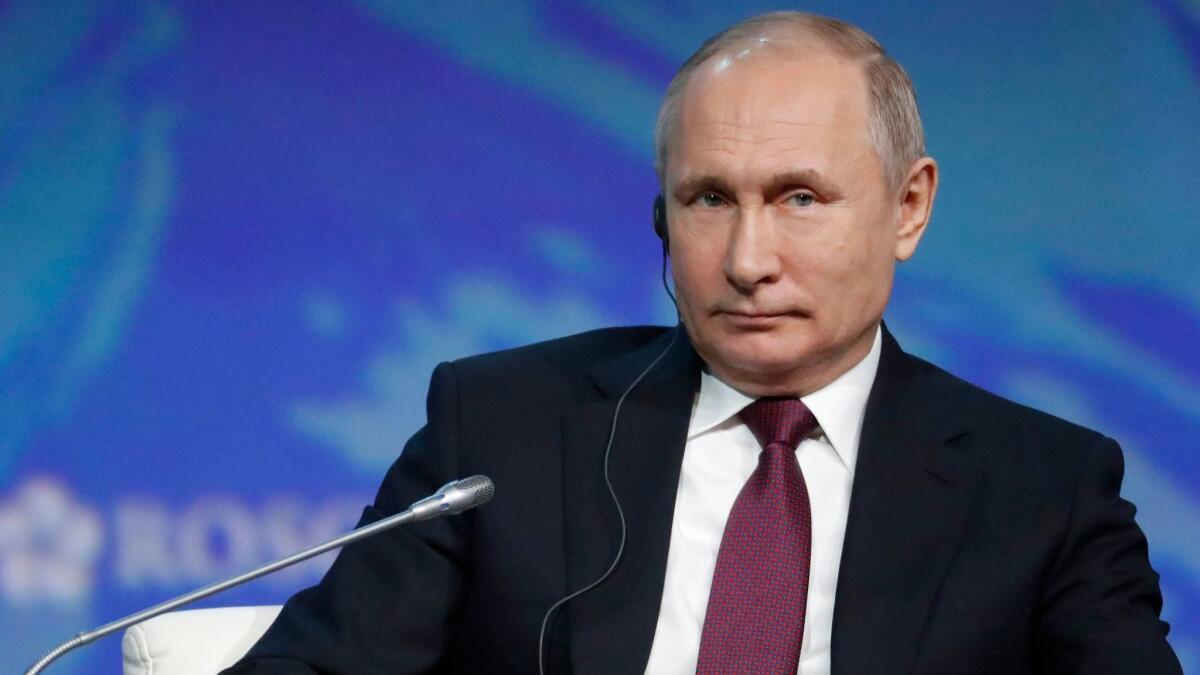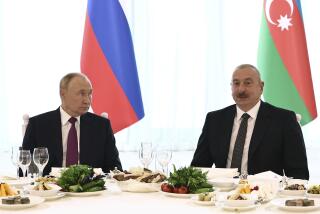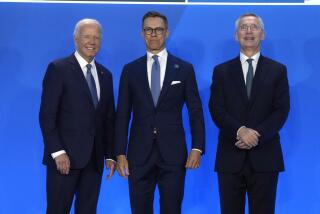Russia’s Vladimir Putin outlines ambitious Arctic expansion program

Reporting from ST. PETERSBURG, Russia — President Vladimir Putin on Tuesday put forward an ambitious program to secure Russia’s foothold in the Arctic, including efforts to build new ports and other infrastructure facilities and expand an icebreaker fleet.
Speaking at the Arctic forum in St. Petersburg attended by leaders of Finland, Iceland, Norway and Sweden, Putin said that Russia plans to dramatically increase cargo shipments across the Arctic sea route.
He said that the amount of cargo carried across the shipping lane is set to increase from 20 million metric tons last year to 80 million tons in 2025.
“This is a realistic, well-calculated and concrete task,” Putin said. “We need to make the northern sea route safe and commercially feasible.”
He noted that Russia, the only nation with a nuclear icebreaker fleet, is moving to expand it.
Russia has four nuclear icebreakers, and Putin said that three more such ships are under construction. By 2035, Russia stands to have a fleet of 13 heavy icebreakers, including nine nuclear-powered ones, he said.
The Russian leader said that his country plans to expand the ports on both sides of the Arctic shipping route — Murmansk on the Kola Peninsula and Petropavlovsk-Kamchatsky on the Kamchatka Peninsula — and invited foreign companies to invest in the reconstruction project.
Other ports and infrastructure facilities along the route will also be upgraded and expanded, he said.
Russia, the U.S., Canada, Denmark and Norway have all been trying to assert jurisdiction over parts of the Arctic as shrinking polar ice creates new opportunities for resource exploration and new shipping lanes.
Speaking at the forum, Norwegian Prime Minister Erna Solberg emphasized the need to respect international law and noted that the Arctic Council provides a key arena for dialogue.
“Now and then I hear the Arctic described as a geopolitical hot spot,” she said. “This is not how we see it. We know the Arctic as a region of peace and stability.”
Solberg and other leaders who spoke at the forum underscored the need for all countries in the Arctic region to focus on areas of mutual interest despite differences.
The Russian military has revamped and modernized a string of Soviet-era military bases across the Arctic, looking to protect its hold on the region, which is believed to hold up to a quarter of the Earth’s undiscovered oil and gas.
Addressing the forum, Russian Foreign Minister Sergei Lavrov said that military deployments in the Arctic are intended to protect national interests.
“We ensure the necessary defense capability in view of the military-political situation near our borders,” Lavrov said, noting that a recent North Atlantic Treaty Organization exercise in Norway was openly directed against Russia.
Russia’s relations with the U.S. and other NATO allies have plummeted to post-Cold War lows over Russia’s annexation of Ukraine’s Crimea, the war in Syria, Moscow’s meddling in the 2016 U.S. presidential election and other issues.
Finnish President Sauli Niinisto emphasized the need to seek common ground despite Russian-Western tensions.
Putin used the forum to criticize the U.S. and the European Union sanctions against Russia over its action in Ukraine, but insisted that they wouldn’t hamper the country’s plans to expand its presence in the Arctic.
The Russian leader emphasized the challenges to the polar region posed by global warming, saying that Russian scientists believe that the climate is changing faster than indicated by earlier estimates.
More to Read
Sign up for Essential California
The most important California stories and recommendations in your inbox every morning.
You may occasionally receive promotional content from the Los Angeles Times.










